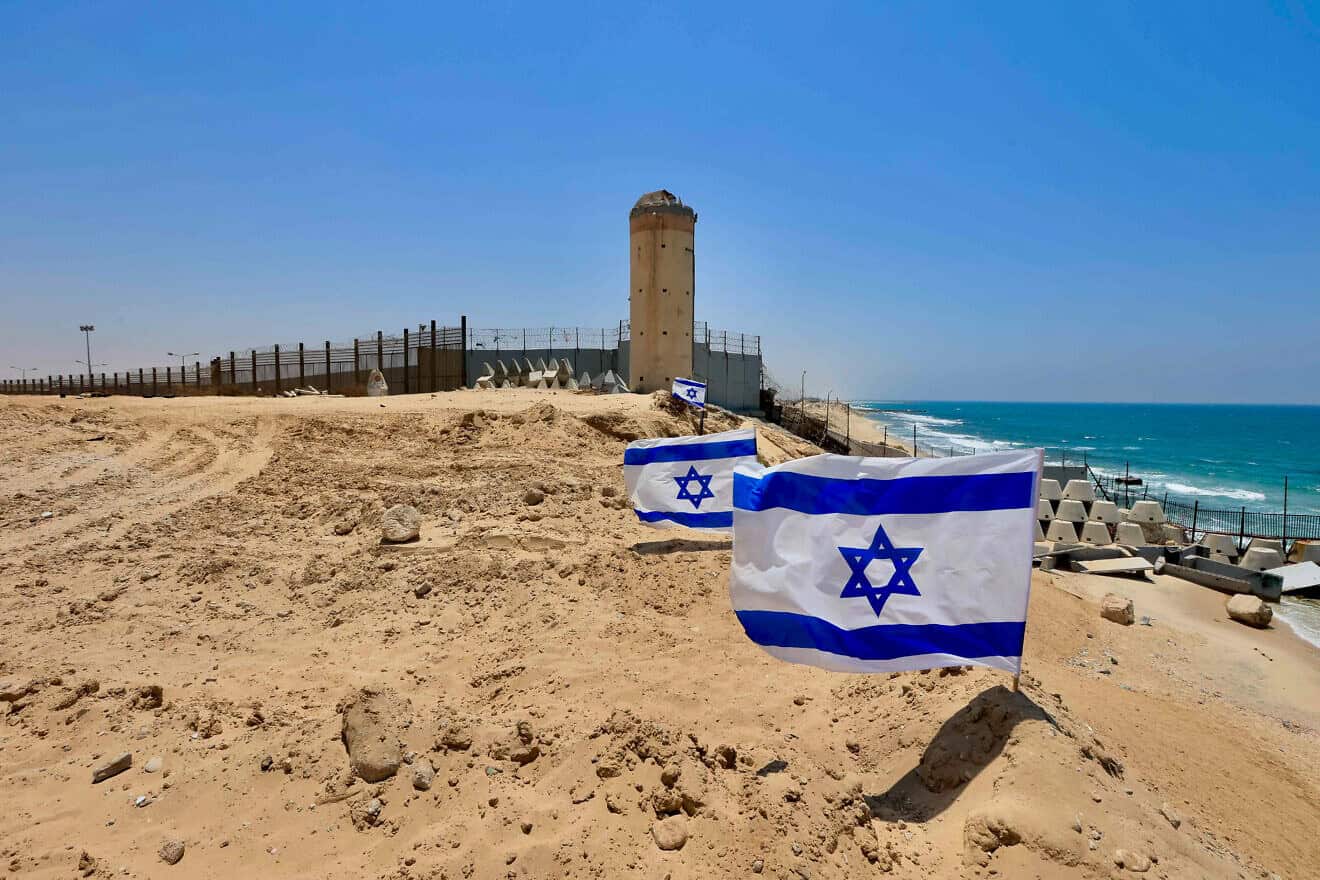Israeli and international media are transfixed by anti-government demonstrations in Tel Aviv demanding an immediate hostage deal at any price, per a new, in-depth JNS poll of Israeli public opinion.
The survey, conducted by Direct Polls, suggests an overwhelming majority of Israelis oppose the demonstrations and support Prime Minister Benjamin Netanyahu’s negotiating positions.
Support for Netanyahu’s positions comes not only from voters for parties in his government coalition. His positions are also supported by about a third of opposition party voters, per the survey data.
Direct Polls conducted the survey Monday evening both before and after the prime minister’s press conference, in which he set out the rationale for his refusal to remove Israel Defense Forces troops from the border zone between Gaza and Egypt known as the Philadelphi Corridor, its code name on IDF maps.
Pollsters found a significant disparity in Netanyahu’s favorability ratings before and after the press conference.
JNS asked respondents: “Do you believe Israel should support or oppose a deal that conditions the receipt of between 18-30 hostages on an IDF withdrawal from the Philadelphi Corridor for six weeks, during which Hamas will be able to rearm and smuggle hostages out of Gaza?”
Before Netanyahu’s conference, 65% of respondents from the opposition party supported withdrawing from the corridor, compared to 57% from that group after the press conference. Support for the withdrawal from coalition voters dropped from 8% before the speech to 5% after the speech.
Overall, 35% of respondents said that Israel should agree to such a deal, with 62% saying the Jewish state should oppose it. Some 3% had no opinion on the matter.
Some 7% of those in the parties that are part of Netanyahu’s governing coalition supported leaving the Gaza-Egypt border and 92% opposed it. Some 62% of opposition voters agreed with such a measure, while 33% opposed.
The disparity was even more apparent in the ways opposition voters polled before and after Netanyahu’s speech viewed mass anti-government protests for a hostage deal.
More than half (52%) of opposition party voters said before the press conference that the demonstrations advanced the goal of getting the hostages home, 32% said that they had no impact on achieving a deal that would get the hostages home and 16% said that demonstrations decreased the chance of getting a hostage deal with Hamas.
After the press conference, just 42% of opposition voters said that the demonstrations increased the chances of getting the hostages home, 39% said that the demonstrations didn’t affect the hostages’ plight and 19% said that the demonstrations decreased prospects for bringing them home.
More than six in 10 (61%) Israelis agreed with the sentence: “Only military pressure on Hamas leader Yahya Sinwar and planned military actions including hostage rescue operations can lead to the release of the hostages.”
A third (33%) agreed that “continuing IDF operations in the Gaza tunnels endanger the hostages’ lives.”
Israelis are sharply split over whether Netanyahu holds responsibility for the execution of the hostages. Opposition voters support the claim 69% to 28%, while coalition voters oppose it 94% to 6%.
The deal that Netanyahu has accepted involves three phases. In the first phase, Israel would agree to free hundreds of Hamas terrorists from prison and significantly draw back its forces from Gaza while accepting a six-week ceasefire. Hamas would free 18 to 30 hostages. In two later phases of the deal, Hamas would release the rest of the hostages—alive and dead—in exchange for further release of terrorists from prison and continuation of the ceasefire.
JNS asked Israelis if they believe that Hamas is willing to release additional hostages in later phases of the deal, or would the terror organization continue to imprison them as an insurance policy to protect it from destruction.
Nearly seven in 10 (69%) Israelis—88% of coalition voters and 50% of opposition voters—believe that Hamas will not release additional hostages. Only 24% of Israelis, including 10% of coalition voters and 38% of opposition voters, say that Hamas will be willing to release additional hostages.
That means that some 69% of Israelis believe that between 83 and 71 hostages could be left behind in Gaza indefinitely.
Hamas’s reported negotiating position is that Israel must remove all of its forces from Gaza, including from the Philadelphi Corridor, from the mile-and-a-quarter-wide security perimeter in Gaza along the border with Israel and from the Netzarim corridor that separates the northern part of Gaza from its central and southern parts.
Nearly three-quarters of Israelis (73%), including 95% of coalition party voters and 51% of opposition party voters, oppose Hamas’s demands. Some 22% of Israelis support it, including 4% of coalition voters and 40% of opposition voters.
A majority of Israelis do not trust U.S. President Joe Biden’s commitments to support Israel if Hamas breaches the ceasefire-for-hostages deal.
JNS asked respondents: “Do you believe that the Biden-Harris administration will permit or block Israel from reinstating hostilities and reconquering Gaza to defeat Hamas if Hamas breaches the agreement?”
Some 38% of Israelis said the United States would permit Israel to renew military operations, while 56% said the United States would block Israel from renewing its military operations in Gaza. Only 14% of coalition voters believe the Biden administration would support a renewal of operations.
Some 61% of opposition voters trust the Biden administration’s support, while 81% of coalition voters said the United States would prevent Israel from renewing its operations if Hamas breaches a ceasefire deal. Some 31% of opposition party voters said Washington would block Israel from renewing its military operations if Hamas breaches a U.S.-mediated ceasefire-for-hostages deal.
On Sunday, Arnon Bar David, the chairman of Israel’s main labor union the Histadrut, declared a general strike to shut down the economy to force the government to accept a hostage deal. A Labor Court ruled on Monday afternoon that the strike is illegal and ordered that it be stopped immediately.
The damage to the economy from the lost work hours has been estimated to cost about 2 billion shekels (about $535,000).
JNS asked respondents if they believe that the strike advanced a hostage deal, had no impact on prospects for a deal or damaged prospects for such an agreement.
Some 50% said that the strike harmed chances for a deal, 18% said it helped and 32% said it had no impact.
The heads of the anti-government protest groups active since January 2023 and the Hostage Families Forum, which represents a few dozen hostage families, have been cooperating informally since Oct. 7.
In December 2023, former prime minister Ehud Barak, who is the unofficial leader of the anti-government political groups organizing the protests, called for the groups to work with the hostages’ families.
On Tuesday, it was reported that Barak’s associates will begin officially cooperating with the Hostages and Missing Families Forum from now on, effectively merging the group representing a fraction of the hostages’ families with the anti-government protest movement.
JNS asked respondents if they believe that anti-government protest groups have joined the hostages’ families groups mainly to help secure the hostages’ release, to overthrow the government or to advance both goals equally.
Some 55% of Israelis, including 90% of coalition voters and 20% of opposition voters, said that the anti-government groups are helping the Hostages and Missing Families Forum to overthrow the government. Some 20% of Israelis, including 3% of coalition voters and 37% of opposition voters, said the anti-government groups were supporting the Hostages and Missing Families Forum to secure the hostages’ release.
Nearly a quarter (24%), including 7% of coalition voters and 41% of opposition voters, believe that they were helping the forum advance both goals equally.
In light of Israeli Defense Minister Yoav Gallant’s open opposition to the security cabinet’s decision to oppose all withdrawals from the Philadelphi Corridor, JNS asked if Israelis believe he should quit or be fired by Netanyahu, or whether he should remain in his position.
Some 51% of Israelis said that Gallant should be fired or resign, 33%—including 53% of coalition voters and 14% of opposition voters—said that Gallant should resign and 18% of Israelis (32% of coalition voters and 4% of opposition voters) said that Netanyahu should fire Gallant.
Some 45% of Israelis, including 13% of coalition voters and 76% of opposition voters, said that Gallant should remain in his position.
Similarly, 48% of Israelis believe that IDF Chief of Staff Lt. Gen. Herzi Halevi should either resign immediately or in the next few weeks. Some 41% believe that he should leave when the war is over, and just 7% believe he should remain in his position until the official conclusion of his term in 2025.


























